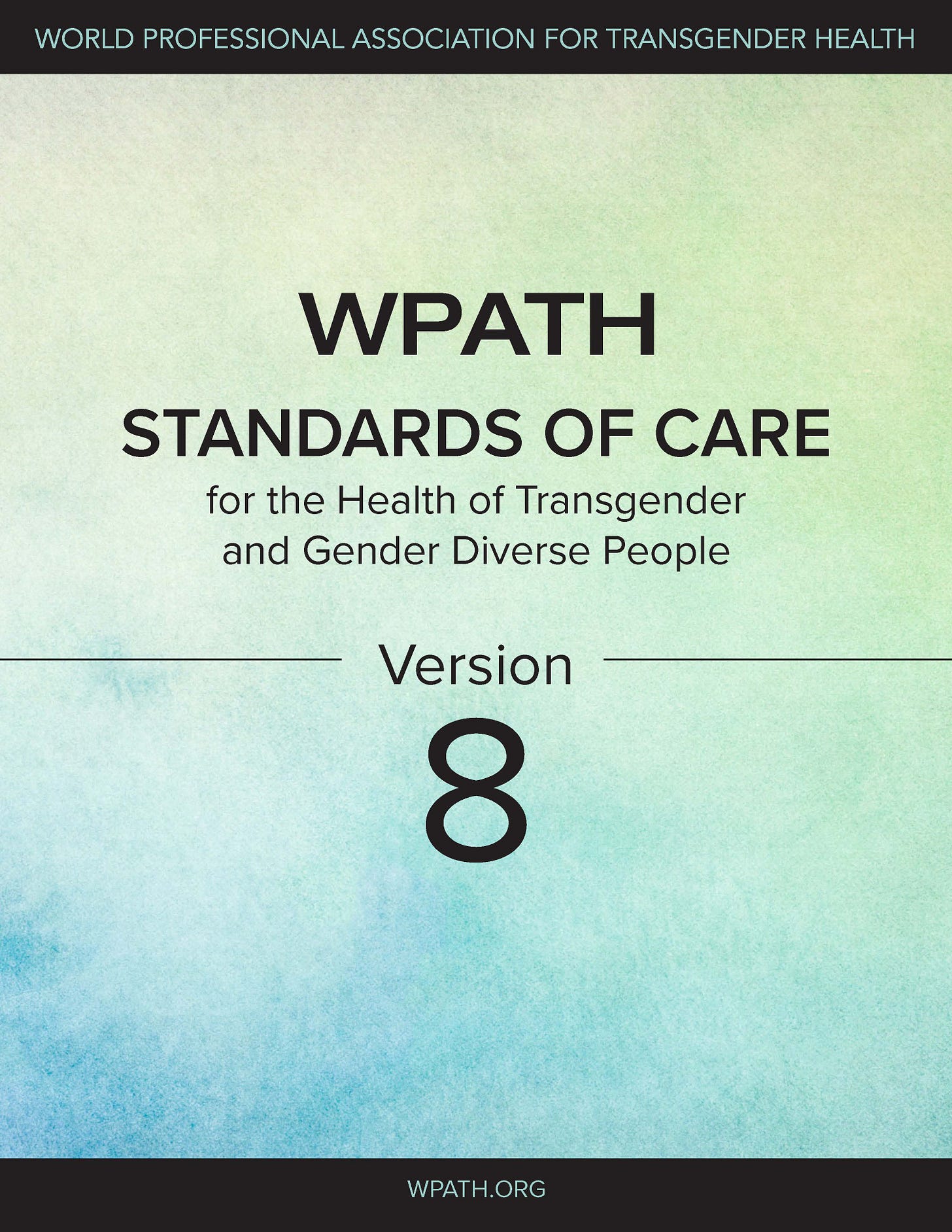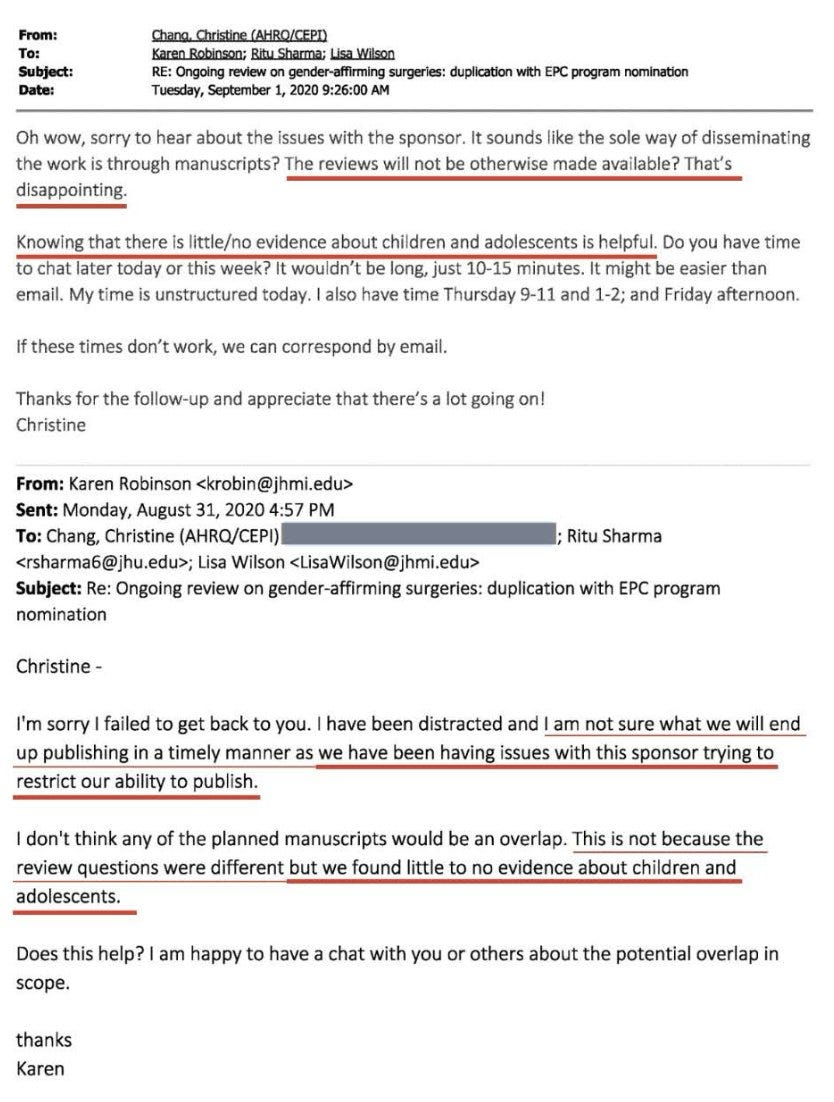WPATH Gets Caught
A damning email reveals what they tried to hide
The World Professional Association for Transgender Health is an advocacy group comprised of both activists and clinicians, who appointed themselves world experts and created documents to outline what they consider proper medical and mental health treatment for people who transition. They call these Standards of Care. Many in the gender medicine biz consider these the North Star of guidance.
“We Follow WPATH Standards of Care,” boasts DukeHealth’s Gender Care for Children and Adolescents. Same for University of Washington. A California community health company, too.
Famously, or infamously, their most recent version, SOC8, included a chapter on eunuch gender identity, but cut out a chapter on ethics, and removed almost all age restrictions for surgeries.
It also included this paragraph:
Despite the slowly growing body of evidence supporting the effectiveness of early medical intervention, the number of studies is still low, and there are few outcome studies that follow youth into adulthood. Therefore, a systematic review regarding outcomes of treatment in adolescents is not possible.
Instead of including a systematic review, SOC8 outlined a few of those low number of studies, and said they showed that gender-affirming care was beneficial.
But a document released this week, as part of an ongoing legal case, shows that statement is false. In fact, WPATH had commissioned evidence-based medicine experts from Johns Hopkins to conduct a systematic review. As with all the other such reviews, this one found that there is “little to no evidence about children and adolescents.” That is, there were studies they could look at and that might claim good outcomes (or bad), but because of the studies’ designs or other limitations, they couldn’t be relied on as evidence.
These emails, between Johns Hopkins and the HHS’s Agency for Healthcare Research and Quality, indicate that WPATH prevented the publication of the review.
As for the studies that WPATH included in SOC8, the Cass Review—the recent report commissioned by NHS England to evaluate youth gender medicine—noted that “authors cite some of the studies that were already deemed as low quality, with short follow-up periods and variable outcomes, as well as a selected account of detransition rates.”
WPATH 8 concludes in its statement on the use of gender-affirming medical treatment that: “The evolving evidence has shown a clinical benefit for transgender youth who receive their gender-affirming treatments in multidisciplinary gender clinics (de Vries et al..,2014; Kuper et al.., 2020; Tollit et al., 2019)”.
•De Vries et al. (2014) is the original study of the Dutch protocol sample, which has marked differences to the population being treated currently, and as discussed had much stricter criteria for treatment.
•Kuper et al. (2020) is a study with a one year follow up that showed very modest change. It fell into the group rated by the University of York research team as too low quality to be included in their synthesis of evidence on masculinising/feminising hormones (Taylor et al: M/F hormones).
•Tollit et al. (2019) is a study protocol and does not include any results.
and:
“WPATH 8 overstates the strength of the evidence in making these recommendations.”
The only reliable guidelines Cass could find came from Sweden and Finland, where they implemented high bars to entry for youth gender medicine, with long-term evaluation and long-term follow-up. Their strict protocol came after—wouldn’t you know it—a systematic evidence review.
Will the AAP finally conduct the review that it promised? Will that make a difference? Will WPATH release the Johns Hopkins review? Will any of these medical associations shift gears?
We’ll have to engage in some watchful waiting to find out.




Lisa. I’m a pediatrician. I’m an AAP member although I completely disagree with their insane view on gender medicine. The AAP has no true expertise in systematic reviews. They would have to commission one. Their guidelines are really more based on expert panel literature reviews and don’t use the methodology of a true systematic review. And what’s the point now that the Cass review has been published? The AAP is really out on a limb here.
Will a sufficient number of the voting public be willing to take (or capable of taking) in this latest revealed evidence that our government, medical and social institutions are destroying large numbers of young people by placing them under the "care" of white coat-wearing witch doctors and butchers?
I recently discovered that a friend whose daughter has recently managed to desist a bit from a years-long fixation on a trans identity has heard/read absolutely nothing about the Cass Report or the WPATH files. (And how can I blame a widow too busy supporting 3 mentally fragile teens to obsessively read the news about the culture war and this medical scandal like I do?)
The difficult reality is that most people are just too busy and stressed to know (even if the fortunes of those they most care about depend upon the medical system somehow reforming itself).
To make any progress in undoing some of the damage that influential ideologues have already done to our public policy and the processes governing just about everything in our social lives, it seems the most effective motivator is the "ick" response most people will have to an ugly old fat man wearing a dress and lipstick (which we have seen can be overcome by a rush of guilt for having that disgust response in the first place - so many "trans allies," I suspect, are motivated by a need for penance.).
But, the general ignorance and apathy of the vast majority of people are the most powerful allies that the witch doctors benefit from, and I am growing so weary trying to find ways to push back against that. So weary that I'm almost ready to concede lately to those whose tactics I fear triggers an overcorrection, other words a whole society regressing back to a state were we all are constrained once again by the traditional prejudices and prudery that historically forced so much of human self expression into the closet or out to the margins of society.
Is it just an ugly truth that the human condition makes a "free to be you and me" culture an impossible dream?